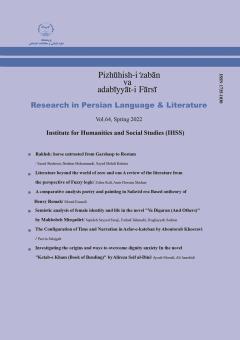Semiotic analysis of female identity and life in the novel "Va Digaran (And Others)" by Mahbobeh Mirqadiri
Subject Areas : Literary Criticism and Theory
Sepideh Seyed Faraji
1
,
Farhad Tahmasbi
2
*
,
Ruqayyah Sadraie
3
![]()
1 - PhD Student in Persian Language and Literature, Science and Research Branch, Islamic Azad University, Tehran, Iran.
2 - Associate Professor, Department of Persian Language and Literature, Islamshahr Branch, Islamic Azad University, Islamshahr, Iran.
3 - Associate Professor, Department of Persian Language and Literature, Science and Research Branch, Islamic Azad University, Tehran, Iran.
Keywords: "Va Digaran (And Others)", Mahbobeh Mir Ghadiri, Sociology, Biosexuality, Semiotics.,
Abstract :
Reading stories and novels is one of the ways to study the sociology of society and get acquainted with its cultural and social issues. One of the social issues that has been considered in sociology and has been the focus of storytelling in literature is the issue of biosexuality. The issue of this research is the search for the biosexuality of Iranian women in the novel "Va Digaran (And Others)"and how to explain it with a semiotic perspective. Knowing this in novels can provide a lot of information about society and the views of people in society; One of the tools that can make this possible is social semiotics. In this article, an attempt has been made to clarify the hidden angles of the identity and biosexuality of Iranian women by examining the social signs of the novel "Va Digaran (And Others)"by Mahboubeh Ghadiri using the semiotics of Giro. Findings show that identity is the most important concern of the author and also the main character of the novel (narrator) as the second wife of a married man, seeks to explain aspects of his sexuality that have not previously appeared in the literature. The most important social symbols used in the novel are "place, language and name". Through the language, the narrator reveals women's bio-sexuality with hidden and overt references to female sexual experiences such as puberty, motherhood, abortion, and so on. Mir Ghadiri also well has represented and implicitly has objected to the patriarchal discourse order through the codes of social etiquette (customs).
احمدی، شادی و نسرین علی اکبری (1396) «بررسی تأثیر جنسیت بر به کارگیری تشبیه در آثار فریبا وفی»، فصلنامه زبان و ادب فارسی، سال نهم، شماره 33.
بهرامی، معصومه (1388) بررسی، تحلیل و نقد مجموعه آثار محبوبه میرقدیری و مهسا محبعلی (نقش و جایگاه زن و سیمای هویت زنانه در ادبیات داستانی معاصر)، پایاننامه ارشد دانشگاه پیام نور به راهنمایی مصطفی گرجی.
پارسی¬پور، شهرنوش (1367) «چرا می¬نویسم؟»، دنیای سخن، شماره 17، فروردین، صص 9- 17.
پورنامداریان، تقی (1381) سفر در مه، تهران، نگاه.
حسنزاده، آذین (1383) زن آرمانی، زن فتانه (بررسی تطبیقی جایگاه زن در ادبیات فارسی)، تهران، قطره.
حقشناس، علی¬محمد و پگاه خدیش (1386) «یافتههای نو در ریختشناسی افسانههای جادویی ایرانی»، مجله دانشکده ادبیات و علوم انسانی دانشگاه تهران، دوره 59، شماره 186، صص 27- 39.
سیدان، مریم (1386) «سنت¬شکنی به شیوة زنانه: نگرشی فمینیستی بر یک رمان (ودیگران، محبوبه میرقدیری)»، مجله جهان کتاب.
شماره 222 و 223.
آبان و آذر.
شعیری، حمیدرضا (1390) «نوع¬شناسی مکان و نقش آن در تولید و تهدید معنا»، نشانه¬شناسی مکان، به کوشش فرهاد ساسانی، تهران، سخن.
عبادیان، محمود (1371) درآمدی بر ادبیات معاصر ایران، تهران، گهر نشر.
فرهنگی، سهیلا و معصومه باستانی خشک بیجاری (1393) «نشانه¬شناسی اجتماعی رمان بیوتن»، مجله نقد ادبی، س 7، شماره 25، صص 121-151.
کاظمی نوایی، ندا و فرزان سجودی و مهبود فاضلی و فرهاد ساسانی (1394) «از یقین به تردید: بررسی تحول وجه¬نمایی قهرمان رمان طوبی و معنای شب از دیدگاه نشانهشناسی اجتماعی»، نقد ادبی، شماره 22، صص 133-154.
کامشاد، حسن (1384) پایه¬گذاران نثر جدید فارسی، تهران، نشرنی.
گیرو، پیر (1383) نشانه¬شناسی، ترجمه محمد نبوی.
تهران، آگه.
محمدی اصل، عباس (1394) جنسیت و زبانشناسی اجتماعی، تهران، گل¬آذین.
محمودیان، محمدرفیع (1382) نظریه رمان و ویژگی¬های رمان فارسی، تهران، فرزان روز.
مدرسی، یحیی (1389) جامعه¬شناسی زبان، تهران، آگاه.
مسکوب، شاهرخ (1372) «قصۀ پر غصه یا رمان حقیقی»، نشریه کلک، پژوهشگاه علوم انسانی و مطالعات فرهنگی، آذر و دی، شماره 45 و 46، صص 465- 486.
مصباحی¬پور ایرانیان، جمشید (1358) واقعیت اجتماعی و جهان داستان، تهران، امیرکبیر.
میرقدیری، محبوبه (1385) ودیگران، تهران، روشنگران.
نقابی، عفت و کلثوم جویباری (1389) «نشانه¬شناسی اولین رمان اجتماعی ایران»، مجله دانشکده ادبیات و علوم انسانی دانشگاه تربیت مدرس، س 18، شماره 67، صص 193- 216.

